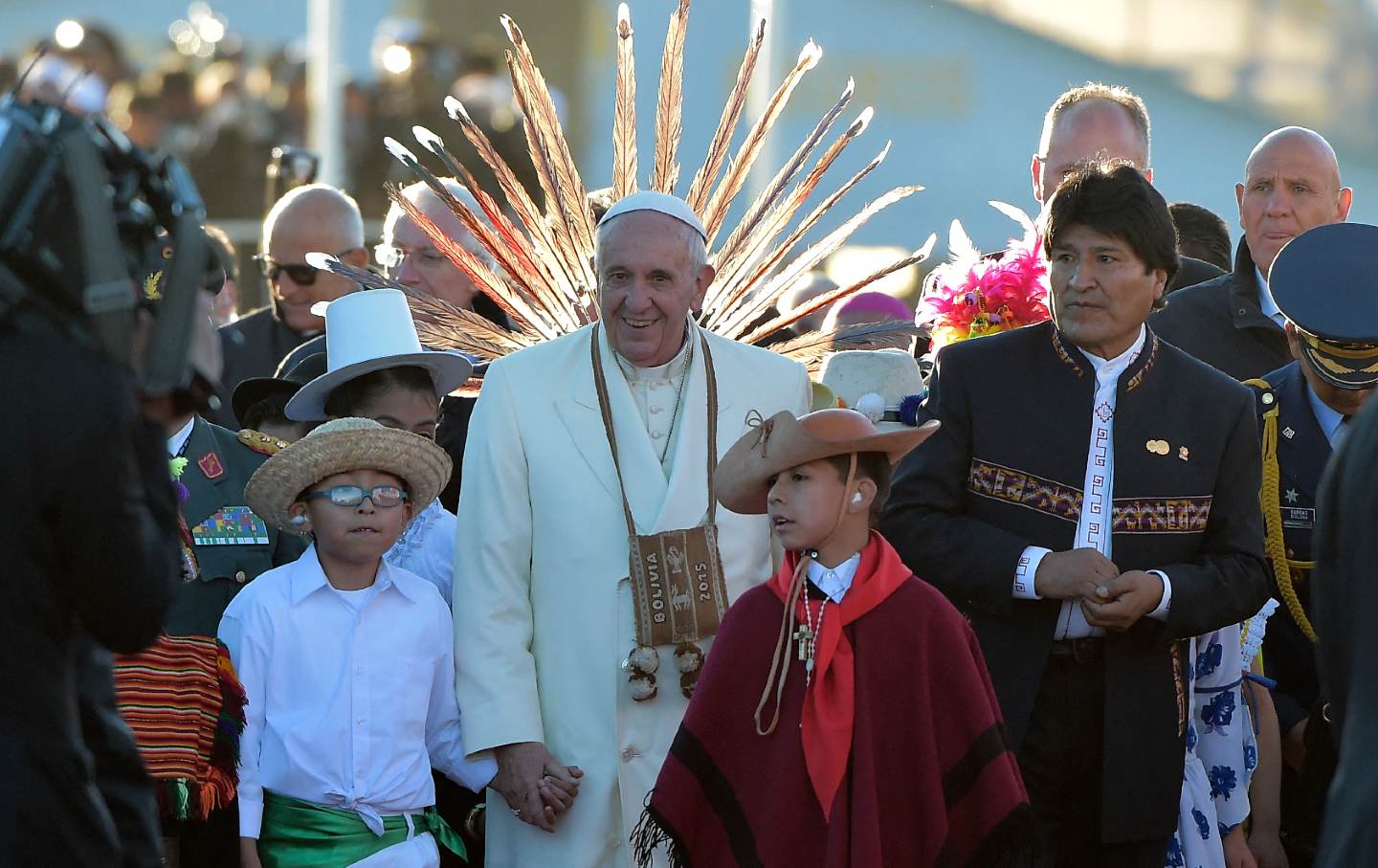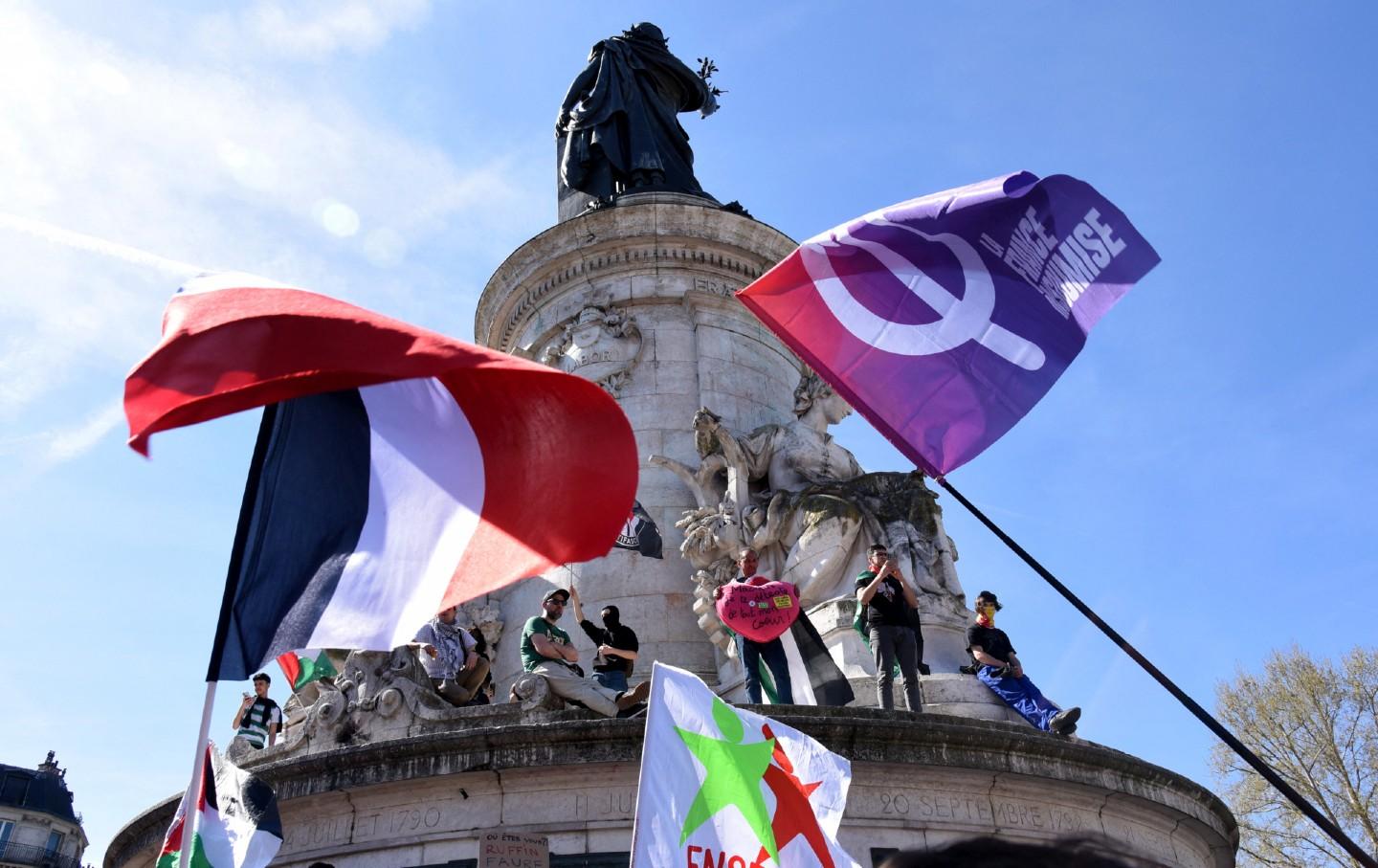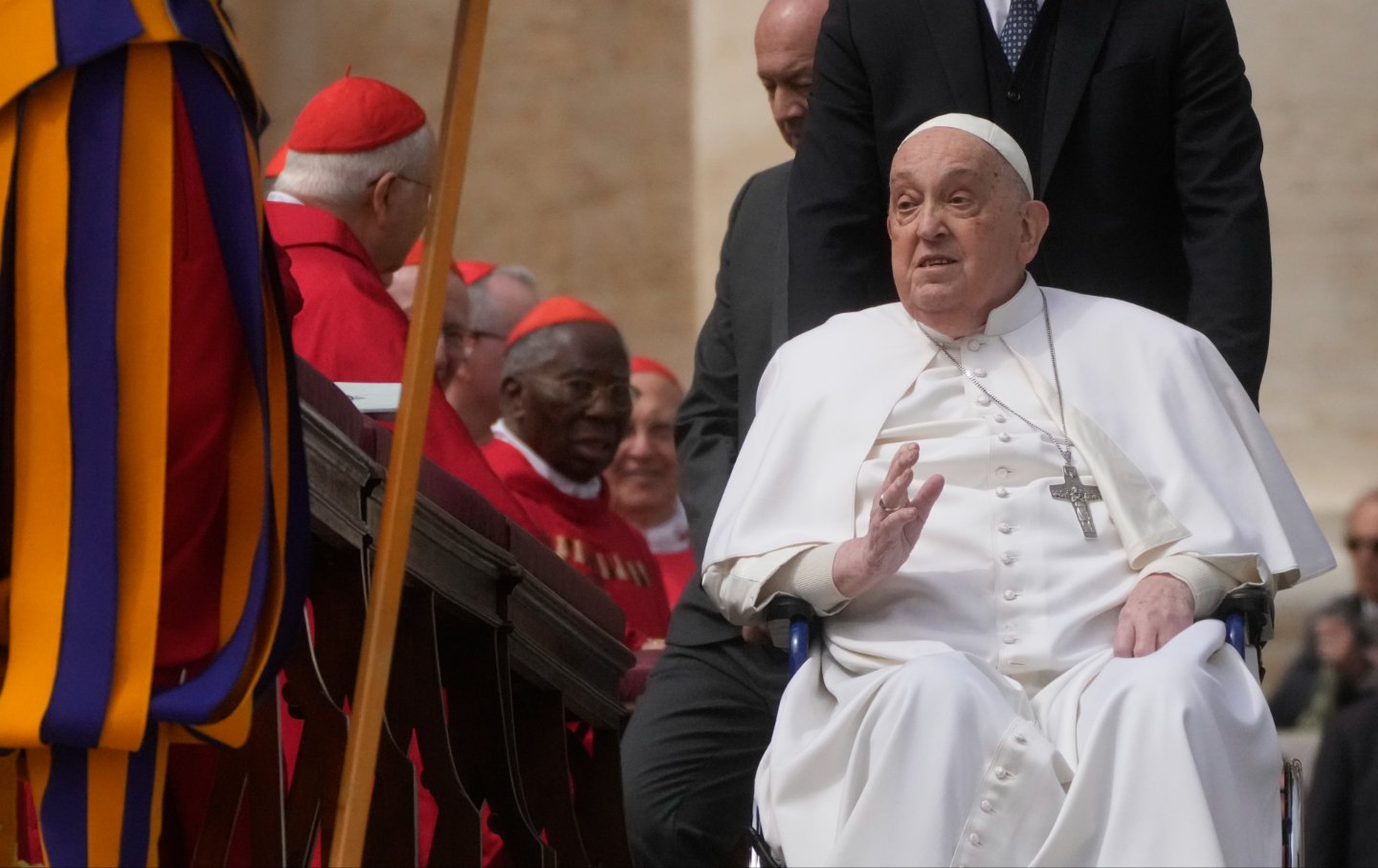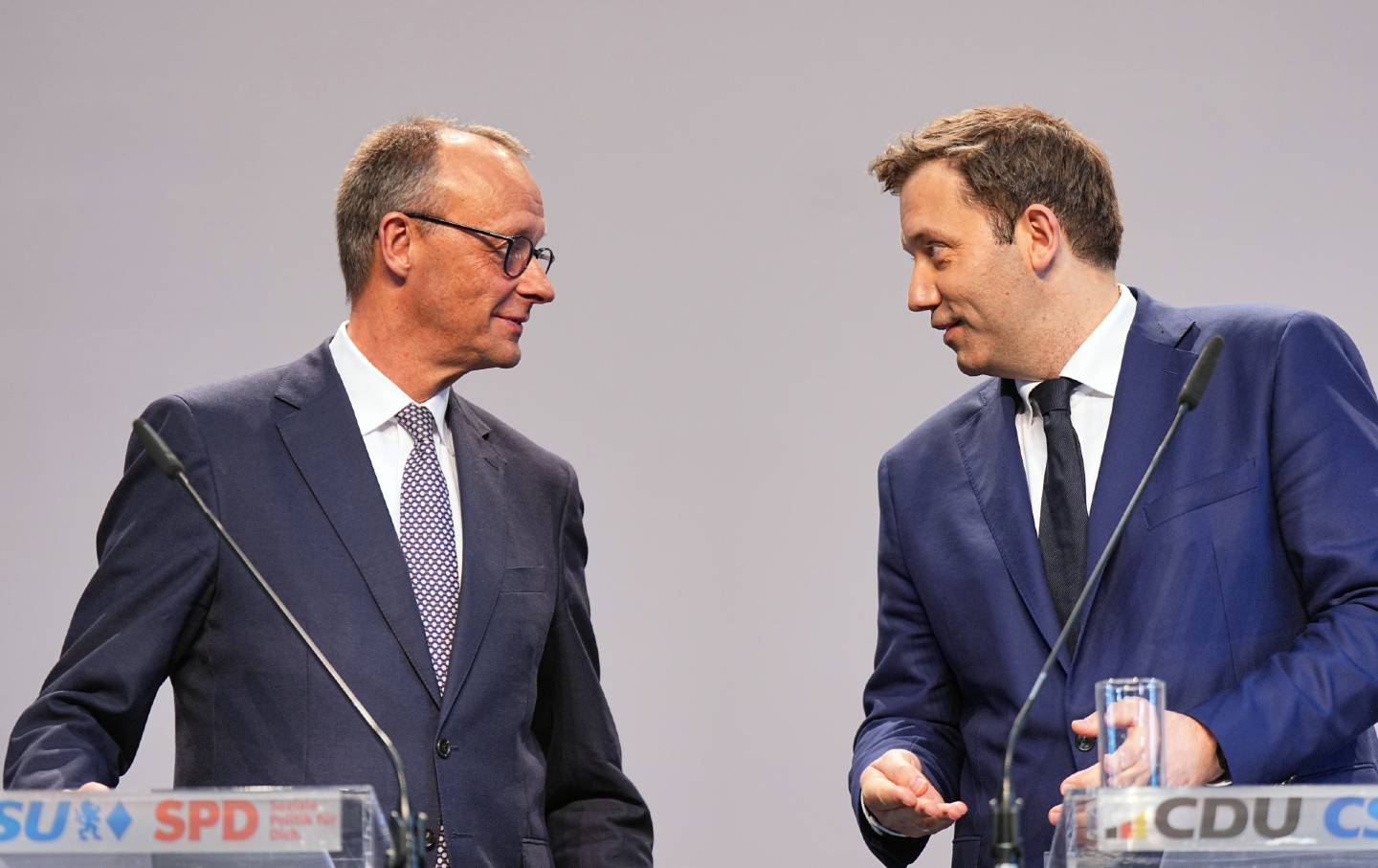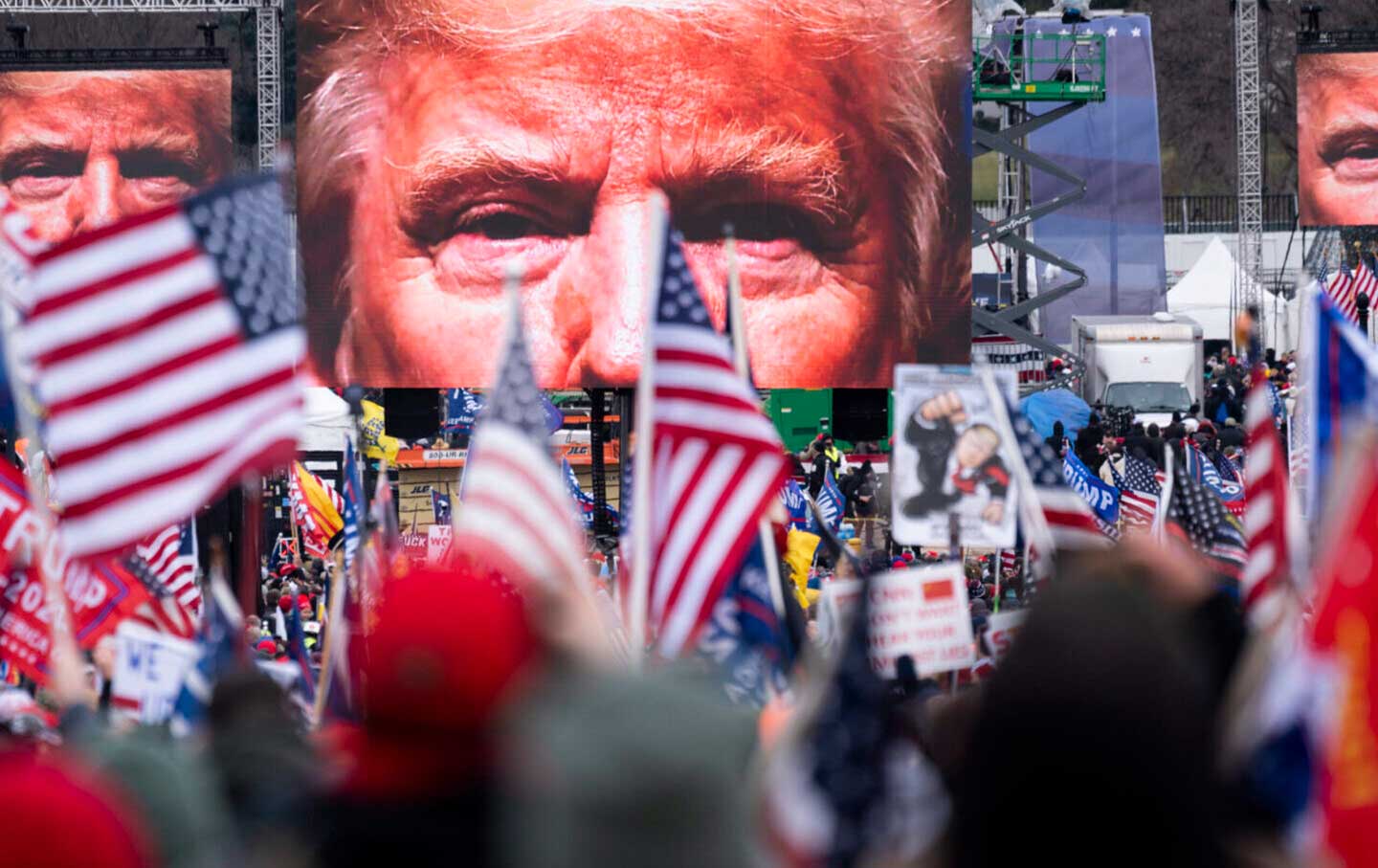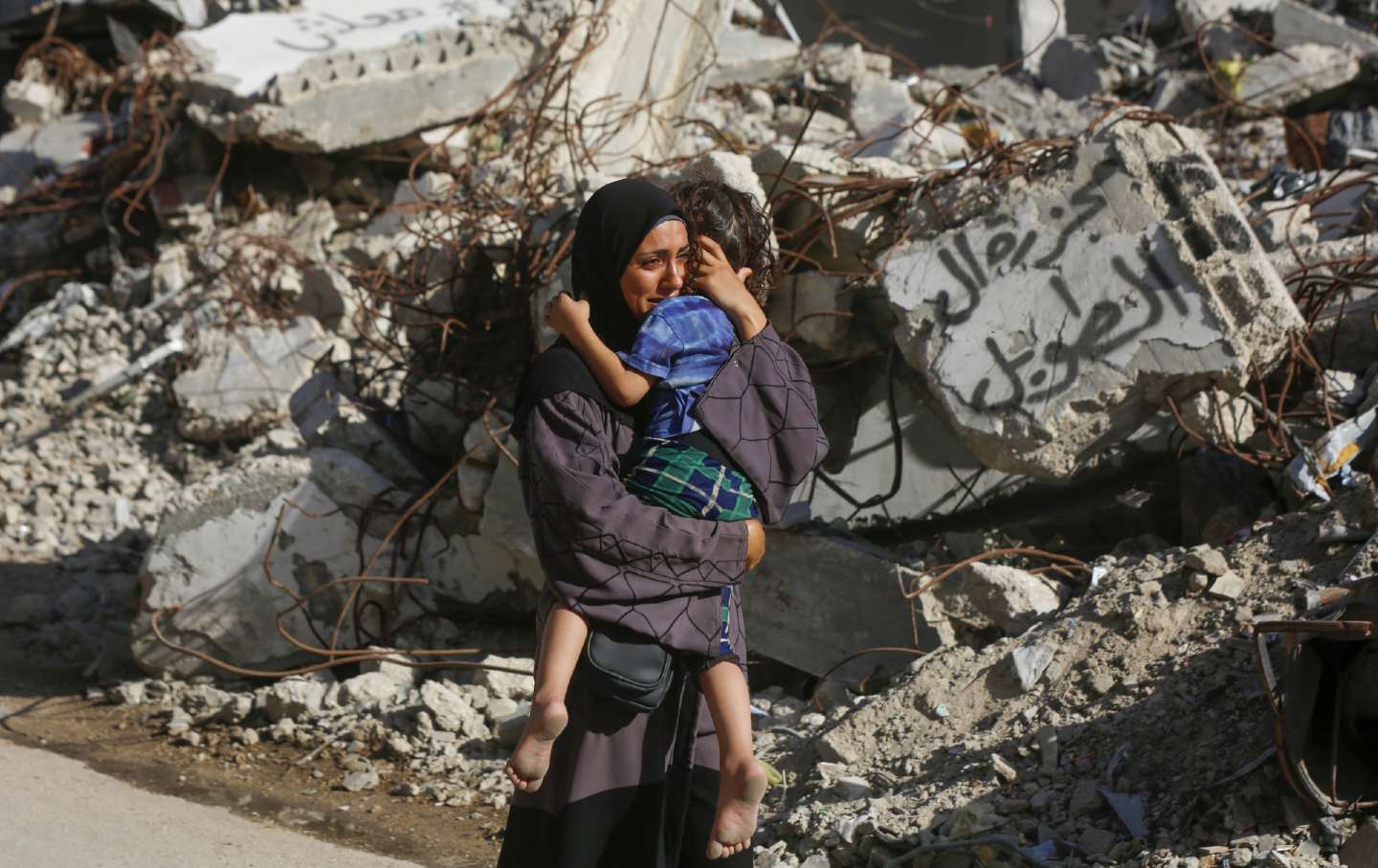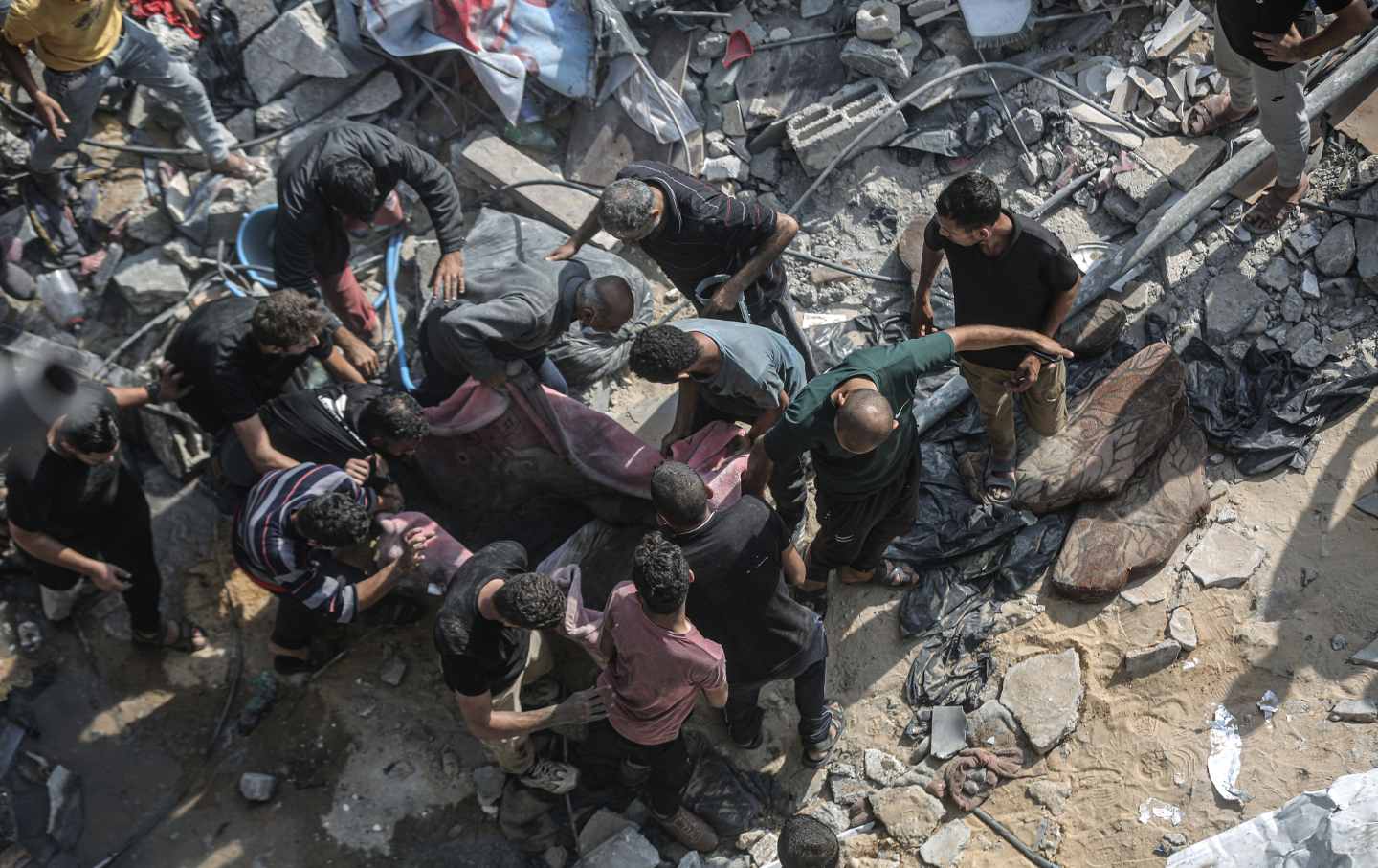
People carry a body, covered with a blanket, as they conduct a search and rescue operation after the second bombardment of the Israeli army in the last 24 hours at Jabalia refugee camp in Gaza City, Gaza, on November 1, 2023.
(Ali Jadallah / Anadolu via Getty Images)Atef Abu Saif is the minister of culture in the Palestinian Authority. He was visiting his family in Gaza on October 7, and has been there ever since. He decided to keep a diary of his experiences as the crisis in Gaza grew worse and worse. These are diary excerpts from the first month of that crisis.
Saturday, October 7
I didn’t have any appointments till 10 am, when I was supposed to be in Kararra, near Khan Younis, to participate in National Heritage Day. This was probably going to be the last chance to swim in the sea this year. It was all going to be so simple.
Read Part 2 of the Diaries
But nothing in Gaza is simple. We arrive at the beach. The sun is still sleeping. I realize this is the first time I’ve swum this year. And the feel of the water is joyous.
Rockets and explosions, coming from sea and land. This is normal in Gaza.
By the time I’m on dry land [I realize] something is going on. This isn’t a one-off strike. We head for the car, but the sand is difficult to run on. We make it to the main road, but the car is still another 500 meters away. The further we go, the more dangerous it feels.
It isn’t until midday that I realize this is different. Instead of Khan Younis, I go to the Press House in the Rimal quarter of Gaza City. There I meet a group of journalists, including Bilal, the manager of the house. The only thing we can agree on is that we have no idea where this is going.
Monday, October 9
The news alerts inform me that the latest air strike in Al Tirrans in Jabalia has killed 50. Al Tirrans is the heart of Jabailia. From there, you reach any other point in the camp quickly. The souq is just a few hundred meters to the south. The elementary schools are over to the west, the area where my family lives is nearby to the east. The supermarket, the bureau de change, the falafel shop, the fruit stalls, the perfume parlor, the sweet shop, the toy shop… all burned. Burned and buried. Walking on the ruins is overwhelming. Blood covers everything. I have to be careful not to step in it.
Tuesday, October 17
Last night, I had no choice but to sleep at my friend’s house in Jabalia. For three nights, I had slept in the gardens of the Press House. Yasser, my 15-year-old son, who was visiting Gaza with me when this all started, spent the nights with me, sleeping by my side. He was terrified, of course.
I was born two months before the 1973 war started, and since then I have lived through an endless war. During the first Intifada, I was shot by the Israeli soldiers. Bullet fragments were lodged in my liver. I was 15 years old at the time. Parts of that bullet are still in my liver. The British surgeon calmed my mother down and told her her boy would survive.
Every time I find death standing in front of me, in the middle of the road, like I did at this moment, I try to gather my courage and convince myself I’m going to survive, just the way the British surgeon told my mum I would. This time is different. This time I can’t convince myself.
Wednesday, October 18
Since yesterday, we haven’t eaten. We only drank coffee, and coffee and more coffee. I passed by many bakeries trying to find one that was less overwhelmed than the others; in the end, I gave up and queued in front of one that only made particularly big loaves, ones used for shawarma wraps, made in a classic clay oven, or “forma.” I got lucky. After only an hour and a half, I was served, and they still had enough flour to make our bread.
Jabilia is one of the most dangerous places in the Gaza Strip, one of the hardest hit. And yet we were lucky to have been there last night. There is no guarantee, anyway, that if I do move south I will be safe. Dozens were killed yesterday in a cluster of missile strikes on the Salah El-Din Road, the main artery of the strip heading south.
As my journalist friend Bilal, who also manages the Press House, always says: There is no safe place in the Gaza Strip.
Tuesday, October 24
For me, the happiest moment is when I wake up, when I clutch myself, check I’m all there, and then look around the room: I made it. I conquered the night. Sometimes I’m still not convinced, so I’ve started to invent tests, to prove I’m alive. One of them is to wake up all the others in the house and start talking to them, exchanging news, the more mundane the details the better. From the dullness of the details, I know it’s not a dream. Another test is calling my wife, Hanna, to tell her that Yasser and I are still alive. Her voice could never be reproduced in a dream.
Wednesday, October 25
I go down onto the street and try, like the other men of the neighborhood, to help in the rescue efforts. It is hard to touch the pieces of mutilated bodies and to gather them on a blanket. Even harder is to try to identify the bodies, first by determining their gender, then their age, then to make the most difficult guess: who was this person.
Thursday, October 26
Popular
“swipe left below to view more authors”Swipe →We count the hours with the number of missile strikes. We mark our days by the number of entire families wiped out. We say, “This happened when Israelis hit the Baptist Hospital,” or, “That happened the day Hatim, Huda, and their family were killed.”
Friday, October 27
One of my relatives, Bothina, asked me unironically when most of her family were wiped out: “Is it my fault, this war?” She wasn’t being rhetorical. “Of course, it’s not,” I told her. Bothina’s question comes back to me in my dreams, her face and the sound of her imploring God, that day, to leave one of her grandchildren alive so that she would have something to show from her life. She tried to make a bargain with Allah. She failed, of course, as two days ago, five days after the original attack on the house they were staying in, we found the bodies of the last two kids.
This morning, another air strike explodes nearby. It is just a few buildings to the north of my neighbor Faraj’s. As usual, we all go to the targeted house to help with the rescue effort. This time it is the house of Mahmoud Mohaiseen, whose mother-in-law is my aunt Ratiba. Twelve people were killed under the rubble. A cigarette saved Mahmoud. He had gone outside to smoke when the attack happened. He lit his cigarette and as he started to inhale the smoke, his home and family were destroyed. He was injured but lost all his kids.
I have no idea what I will eat today. I have to ask Yasser if he will queue at the little Saj Bakery on Wihda Street. There’s a queue of around 50 outside it. I tell him, “You’ll see, an hour and a half, maximum.” While he waits, I go to a supermarket and buy anything in it we can eat without cooking.
Saturday, October 28
I ask my mother-in-law, who was born in Askalan in the year of the Nakba and was brought to Gaza as a baby, “Are you afraid?” With her faint voice, she says, “Of course.”
On the street, people were standing around in groups. Suddenly, we discovered that we had all lost signals, all mobile networks and the Internet had been cut off. Everyone stood around getting busy with their phones, turning them on and off again, trying to reconnect.
When I arrived at Faraj’s place, he confirmed there was no Internet connection or mobile network there either. We are cut off from the world, we realize. We are disconnected from what is going on, even here. All we have to rely on now are the explosions we hear, the fire we see, and the shaking of the ground we feel.
As the explosions grew louder, Mohammed tried to get a radio signal through Faraj’s mobile. After an hour he managed to find one station. The news anchor was talking about the launch of the land invasion; they were even talking about the communications blackout. Mohammed laughed. “It’s funny: today they report on how they can’t communicate with Gazans anymore, but yesterday, when they could, they didn’t actually bother to hear from any of us.”
At six in the morning, I am happy to find myself awake and alive. Faraj has already gone down onto the street. Dozens of local men are out there chatting too, equally glad to be alive. These morning gatherings have become a ritual, like a celebration of survival, of having made it through another night. Haliam has relocated from Beit Lahia to an empty shop down near my aunt Fatima’s building. Nine of them have been sleeping in this cramped, hot place. She tells me that her house was destroyed and that those of her husband’s relatives were as well. The 2014 war destroyed her house, which she rebuilt after four years, and which now this war has destroyed once more.
My father-in-law asks to give him a lift to see Wissam in the Al-Shifa hospital. (Wissam is my wife’s sister Huda’s daughter, and one of the only members of that family to survive an attack in the first week of the war, although she had to have both legs and a hand amputated when she was eventually rescued from the rubble.) We go and spend a few minutes with Wissam, who seems more awake than before. Widad, her sister, tells me that last night Wissam ate for the first time. This is such good news. I ask her what I can bring her later that evening. She says: “Full-fat milk.”
Sunday, October 29
When we get to the Civil Defense station, they tell us that since the signal has come back they’ve been inundated with calls. For the last 36 hours, their teams could only guess where they were needed. Ambulance drivers and police officers were astonished to find dead bodies lying in the middle of the streets in front of them on their patrols. Hundreds are still alive under the rubble right now, they tell me, struggling to survive under the ruins. Some have even sent text messages from under the rubble that were only now being received.
Driving in the city has now become almost impossible. Soon I’ll have to abandon the car completely, either because it runs out of gas or because the street I’m on gets bombed at both ends.
Tuesday, October 31
I’ve brought some pizza for Wissam. Last night, she asked for pizza. I laughed and said, “You know we’re at war, right? No pizzerias are open.” Not to be put off though, I drove way out east to the huge supermarket in Nafaq Street and found some mozzarella. The supermarket was simultaneously empty of products and full of people. Most of what’s left needs to be cooked to be eaten, and no one has the electricity to do this.
I was lucky to find mozzarella. I went from there to my sister Eisha’s place so that I could sleep the night there and wake up early and make it in her clay oven. She still has some fuel left for it. Having studied in Italy for four years, I know how to make a good pizza, but Eisha insisted on making it herself under my close directions.
Outside the hospital, three men and one woman are lamenting the loss of a loved one. They’re standing in front of his body, which lies on the ground in front of the tent where the dead await burial. Two metres to the right of this tent I cannot believe what I see. A piece of brain surrounded by spots of blood is lying on the ground. The piece is like a small ball. It looks fresh. I nearly throw up and keep walking.
Wissam likes the pizza. I boast that it was made under my instructions as an honorary Italian.
The fighting is getting closer. Israeli troops are approaching from the West and the North.
Wednesday, November 1
When Ibrahim called yesterday to ask if I was in Jabalia or not, I had no idea how bad the bombardment had been. Everything is destroyed. The old alleyways and narrow lanes that Jabalia was famous for had now all disappeared. It had all become one place.
This is what we call the Sinada neighborhood. I know every building and who lives in each of them. Many of the alleyways that have disappeared witnessed key moments in my childhood. In my mind, I can redraw those alleyways and redraw the boundaries, resketch the buildings. Give me an architect and a billion dollars and I can rebuild it from scratch.
I spend two hours helping with the relief effort, trying to search for survivors and removing bodies. Raed, a friend, survived a strike on his family home, but now he looks for his loved ones. He points to the spot where he thinks his family must have been sitting when the strike hit. “Usually, they sit in one of these two rooms,” he explains, pointing to a pile of concrete that he has deduced was once those two rooms.
We start removing stones and chunks of concrete with our bare hands. Under the concrete, we find books, lots of them. Raed says, “Yes, I’m right. This is the living room. These are my father’s!” For a second, I can’t help reading the titles of the books. Suddenly, we touch hair. We have to be careful now, as this seems to be a woman’s head. After 19 minutes of clawing at the ruins and removing gravel and sand from the bottom around the head, we are eventually able to carry out the severed head and chest. We put it on a blanket and continue searching for the rest of the body.
After an hour we have only managed to collect severed pieces of her body. Part of an arm. A few fingers. A few spinal disks and the legs. It’s a surreal world. Someone brings me a spade and I dig looking for more bodies. Raed is sure that the rest of them are down there.
A young man shouts that he’s heard someone panicking a few meters east of him. Our work is now to pinpoint the exact source of sound coming from below. After an hour, the young man was saved and carried to the hospital.
Back at Faraj’s place, we sit in silence, not believing what we have just witnessed. We all feel that by the end of the war our entire group will be killed. None of us will be left. For three hours, we chat sharing the names of those we know who’ve died and reminisce about them, refreshing old memories. As we talk, we suddenly remember old friends we hadn’t heard from recently and wonder if they’re still with us. [Our friend] Adham lost two of his cousins. His older son survived by a miracle. He tried to talk to him on his mobile but the boy is incapable of speaking right now. He is too traumatized. Truth be told, we are all traumatized.
In the morning, I get to the Press House very early. I tell Bilal, “I miss myself. I miss Atef. I miss being me.”
Thursday, November 2
Adham lost his son Abed in the air strike last night. The air strike hit Adham’s family home. Now Abed is dead. His grandmother is dead. His aunt is dead. Adham lost three of his family in an instant.
We all kept the light of our mobiles on so that we could help the rescue teams to see better. I tried to take the hand of a boy (maybe 10 years old) whose eyes were still sleepy and to get him into the ambulance. “No leave me,” he says in a very tired voice, “I want to wait for my mum.” “Your mother is OK,” I say to him. “No she isn’t,” he protests. “Where is she?” A moment later a woman is carried past on a stretcher. We take the boy to look at the woman to identify her. It’s not her. Fifteen minutes later his mother is pulled out of the rubble, alive, and he finally agrees to climb inside the ambulance and sit beside her.
An hour and a half ago, another attack destroyed a five-story building at the eastern end of our street, called the Annbar building. I was looking pitifully at the damage and thinking of all the lives hidden under the rubble, when I had a strange memory. In the ground floor of the building there was a famous barbershop owned by the brother of Adham. It is called the Sharawi Barbershop. When I got married, 23 years ago, I had my hair cut there.
Friday, November 3
Only a limited range of vegetables are still available: potatoes, tomatoes, peppers, cucumbers, aubergines, onions, and, if you’re lucky, courgettes. You also need to know the names and locations of all the pharmacies, though they’re currently all closed, of course. But besides all these—shops, groceries, street vendors, pharmacies—the most important thing you need to become an expert in is bakeries. Personally, I know all the operating bakeries on the route from Jabalia to Gaza City.
Last night, I planned to go to bed early. But Adham, who is still in shock from the loss of his son, mother, and daughter, couldn’t stop crying.
At 5 am, we hear the street coming alive below the window. People are heading to the bakery already to get a good place in the queue, some are carrying their batteries to whichever solar-paneled house has electricity; some carry mattresses back to their homes after sleeping at relatives. The vegetable man starts shouting about his cucumbers. No milkman, no sweet seller. The war doesn’t give you options.
Saturday, November 4
A missile struck one of two schools where hundreds of families had been seeking refuge. They’d moved there from their houses in the west, near the beach. Most of the kids that died were also pupils of the schools. Instead of learning math, they learned death. Not a single body retrieved from the massacre was complete. They were all obliterated. The scene looked like a meat shop where the butcher really enjoyed his job. Where he did it all for fun.
Last night, I failed to get any bread. Nor could any of my friends spare me any. Instead, I boiled macaroni, added some salt, and ate it. I promised Yasser: “Tomorrow we will have bread.” Now it’s midday of the “tomorrow” in question, and I have no idea how I’m going to secure any bread for us. I still have one small bag of macaroni. I am a lucky man to have it. But convincing Yasser how lucky we are might be different.
Sunday, November 5
It was around 7 pm; I had just parked the car not far from Faraj’s place and was intending to walk the rest of the way when I saw my father. He was heading towards my sister Amina’s flat, in a five-story block some 20 meters away, and asked for some help climbing the stairs alone in the darkness. My son Yasser took his hand and accompanied him. As I waited I saw Fakhry, an old friend, crossing on the other side, and called him over to chat. Fakhry is older than me. He’s one of the few people in the neighborhood who’s still affiliated with a left-wing party, and just the night before he had been explaining to me a true leftist would never change their affiliation to a religious faction, which he regards as inherently right-wing. When I called out to him, he said he was just going to the toilet and would be back in a minute.
Suddenly, a wall of fire smashed into me, followed by smoke. Before I knew it, I was standing in a cloud of dust. I tried to run. Huge quantities of rubble were showering down on us. I covered my head with my hands and ran down the narrow road to the south, trying to find anything to hide under. Somehow I had lost my shoes. I ran barefoot, my brothers Mohammed and Ibrahim running alongside me. After about 200 meters, I had to stop.
After a moment, I walked back towards the car and tried to find my shoes. Until now, I hadn’t felt anything. Only then did I notice something warm on my leg. It was blood. A lot of it. I wiped it away with my hand and walked towards the targeted houses.
Someone shouted that there was someone under the rubble near the tree out in the street. We all tried our hardest to remove the concrete and cement. To my horror, it was Fakhry lying there. Dead.
The ambulance arrived and the Civil Defense team as well. We carried Fakhry on a stretcher. My relative Fouad was found near the door of his house. Luckily, we managed to remove some rubble which fallen around his face, so that he could breathe. After 10 minutes we got him out. But there was news about Maha, his wife, and their five kids. Maha is also Hanna’s cousin. It’s believed they all died in the fire, if not before.
Niha, another woman from my family, was found dead lying in her bedroom, in a building on the other side of the street, having been hit by a concrete lintel thrown from the targeted building.
I have spent most of today lying on a bed in the Press House. My wound seems to be more painful. I clean it again, this time with salt and water, and cover it using a new piece of cloth.
Poor Hanna. From one loss to another. Now her cousin. Once more, I listen to her cry over and over on the phone.
Monday, November 6
This morning Mohammed al-Jaja was killed along with his entire family. I cried when I heard the news. Yesterday, I stood with him at the front door of the Press House and suggested that he didn’t stay in his flat in the Nasser Quarter. It was getting too dangerous there. He lived in a first-floor apartment in a building on the same street as Al-Shifa Hospital. Bilal told him to bring his family and move into the Press House that night.
He scoffed at the idea and, as he walked away, said, “See you tomorrow.”
When I go to visit Wissam, I see Mohammed’s body laid out on the ground outside the hospital among dozens of corpses, the spoils of last night’s raids on Al-Shati camp and Nasser Quarter. I don’t realize it’s him at first. I just see his blue vest and think, “What a shame, another journalist.” It doesn’t occur to me that it might be him.
Over the last week, Mohammed has come into the Press House each day with five spare bundles of bread, to distribute among his friends. Some days, of course, he failed in his search and would feel guilty when he showed up empty-handed. “It’s OK,” Iֹ’d say, “Man can survive without bread.” Now, we have to survive without him. He had a plan to take his wife and kids on a vacation in Europe. “We’ll take a whole month,” he had said. “You thinking of immigrating?” I asked, surprised. “No,” he said firmly. “The future will be better in Gaza.”
From the window of the fourth floor in Al-Shifa Hospital, the view below is beyond belief. Dead bodies lie scattered across the ground in all directions. Camera teams huddle around interviewees. A group of young girls sit, playing with toys together. A man and a woman are setting up a tent, for their family, trying to clear some space for them and their kids. Three ambulances arrive bringing more dead from last night’s raids. A dozen men queue outside a barber’s stall, waiting to have their hair cut. A young girl fixes her hijab so it looks more suitable on her head. For an hour, I gaze over this new town of Al-Shifa, a town made out of refugees from the city that used to be known as Gaza.
Tuesday, November 7
Gaza is bleeding away: Fresh food has all but gone, the only produce left in shops are dry, nonperishables; the queues for water are getting longer; and people are disappearing.
I went to the Jabalia town center last night to look for some meat, but since we arrived late, all the butcher shops were closed. I promised Faraj that I’d prepare something delicious for us that night. I don’t remember when I last ate red meat. We had chicken about 10 days ago, but not red meat. I asked Faraj to get us some flour. “Flour?” he questioned. “Yes, just trust me,” I said. It seems luck is staying with me tonight, as I find a stall selling turkey. The man is busy taking orders from those crowding around his table. His assistant slaughters the birds, plucks them, and cuts them into thighs, chests, and wings as we wait. He sells you what you ask for, up to a certain limit. I managed to get a kilo and a half.
We made a fire on the second, unfinished floor of the house. I mixed the flour with water and salt. Then Mohammed helped in making the paste into loaves, ready to be baked. On the fire, I put a piece of metal which, once heated up, became our “forno.” I made 20 small loaves, then I started to prepare the turkey, which I cut into slices. In a huge pan, on the fire, I fried the onion and pepper before mixing in the meat. Some spices from the kitchen—then we had our meal. This is what we call sajia, which is made on wood fire only. What a feast we had!
Yasser asks me why there is only lemon in the vegetable shop. “Because there is only lemon,” I reply. “But what are people using it for?” he continues. Even lemonade needs bottled water, and no one has that anymore.
Wednesday, November 8
For the last few nights, my brother Mohammed’s snoring has been a kind of consolation. When I hear his snoring, I forget about all the other sounds and become fully occupied by my simple, natural annoyance. Ironically, this annoyance allows me to escape the situation and ultimately fall asleep. But last night Mohammed didn’t snore. People say you snore because of the position you’re sleeping in. So I tried to roll him over, I didn’t want to think of the rockets anymore. I wanted a goddamn break. In a way, I was begging him to snore. But he wouldn’t.
I went to pay my condolences to my friend Saleem and his mother for the loss of his brother Majid. Majid passed away in an Israeli jail recently after the soldiers refused to give him his medication. For the last couple of years, he had suffered from cancer and had to take specific treatment. After the war broke out, he was arrested along with many other laborers in Israel, from Gaza. In the prison, the soldiers took his medication off him and threw it away. His mother now has one wish: to see him before he’s buried. This means bringing his body back to Gaza. She knows how impossible this is nowadays, but her heart, the heart of a mother, does not.
Bilal looks at me piercingly. “How much longer, Atef?” he asks. I know what that look means. The war has dragged on much longer than either of us expected. “When, exactly?” I know what he’s trying to suggest. I relent. Come tomorrow, I say, we will start thinking about heading south. I make a promise that we’ll move together. We’re out of options.
Then comes the question: Where will we stay in the south and how we will manage? There are many difficulties ahead of us if we cross the wadi.
As I write this in the Press House, I can hear men, women, and children shouting in the street. I go out front to see what’s going on. Hundreds of them are carrying their belongings and running down the street. “What’s happening?” I ask and a man tells me they were all staying in the UNRWA [United Nations Relief and Works Agency for Palestine Refugees in the Near East] schools near the beach, close to the fish market. But the tanks are there now, so they had to leave.
He suggests that we take care, as the tanks and bulldozers are approaching. According to him, the tanks are now just half a kilometer from the Press House. Many people have been killed at the western end of the street, for just getting in the tanks’ way. Another man tells me he saw tanks and bulldozers destroying the mosque near the schools and the villas around it. “They burn everything,” he shouts as he runs, without slowing down.
Separate portions of this diary can be read at The Washington Post and The Guardian.
Hold the powerful to account by supporting The Nation
The chaos and cruelty of the Trump administration reaches new lows each week.
Trump’s catastrophic “Liberation Day” has wreaked havoc on the world economy and set up yet another constitutional crisis at home. Plainclothes officers continue to abduct university students off the streets. So-called “enemy aliens” are flown abroad to a mega prison against the orders of the courts. And Signalgate promises to be the first of many incompetence scandals that expose the brutal violence at the core of the American empire.
At a time when elite universities, powerful law firms, and influential media outlets are capitulating to Trump’s intimidation, The Nation is more determined than ever before to hold the powerful to account.
In just the last month, we’ve published reporting on how Trump outsources his mass deportation agenda to other countries, exposed the administration’s appeal to obscure laws to carry out its repressive agenda, and amplified the voices of brave student activists targeted by universities.
We also continue to tell the stories of those who fight back against Trump and Musk, whether on the streets in growing protest movements, in town halls across the country, or in critical state elections—like Wisconsin’s recent state Supreme Court race—that provide a model for resisting Trumpism and prove that Musk can’t buy our democracy.
This is the journalism that matters in 2025. But we can’t do this without you. As a reader-supported publication, we rely on the support of generous donors. Please, help make our essential independent journalism possible with a donation today.
In solidarity,
The Editors
The Nation

